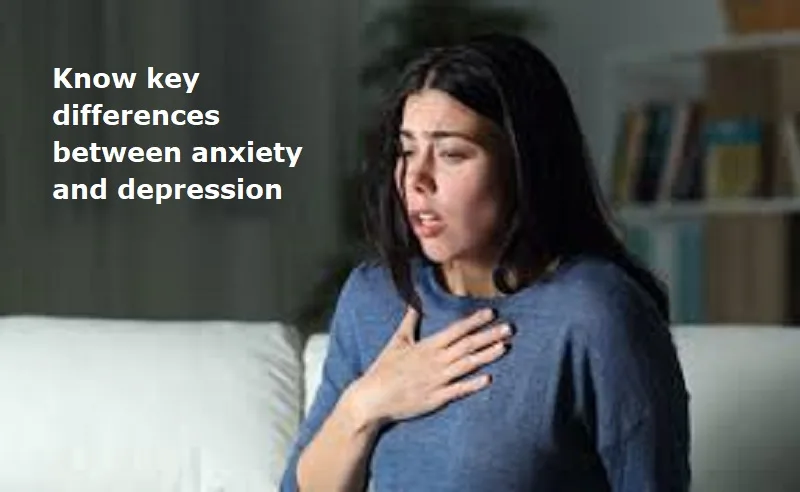
Anxiety and depression, are often misunderstood and mistakenly interchanged. Both these common mental health disorders, share some symptoms, they are distinct conditions.
Anxiety and depression differ fundamentally in how they affect a person’s emotions, thoughts, and behaviours. Anxiety is typically characterised by excessive worry or fear about future events, often leading to physical symptoms like rapid heartbeat or restlessness. On the other hand, depression manifests as persistent sadness, a lack of interest in previously enjoyed activities, and feelings of hopelessness. While anxiety leans towards hyperactivity of the mind, depression often causes a sense of mental and physical shutdown.
How anxiety and depression can be differentiated
1. Emotional symptoms
a. Anxiety
Involves heightened worry, fear, and nervousness. Individuals feel constantly on edge and are often overwhelmed by hypothetical worst-case scenarios.
b. Depression
Associated with pervasive sadness, emptiness, and a loss of pleasure or interest in life. The emotional state often feels like a heavy cloud that doesn’t lift, regardless of circumstances.
2. Focus of Thoughts
a. Anxiety
Thoughts are future-oriented, revolving around potential dangers or uncertainties. This preoccupation with “what ifs” can be paralysing.
b. Depression
Thoughts are past- or present-oriented, often fixated on feelings of worthlessness, guilt, or hopelessness about life.
3. Physical Symptoms
a. Anxiety
Common physical manifestations include rapid heartbeat, sweating, trembling, gastrointestinal distress, and difficulty sleeping due to a racing mind.
b. Depression
Physical symptoms may include chronic fatigue, appetite changes (either overeating or loss of appetite), body aches, and disruptions in sleep patterns, such as oversleeping or insomnia.
4. Behavioural Changes
a. Anxiety
Individuals may avoid specific situations, become hyper-vigilant, or engage in compulsive behaviours to alleviate their fears.
b. Depression
Behavioural symptoms often include social withdrawal, neglect of responsibilities, and a noticeable decline in motivation to perform daily tasks.
5. Duration and Triggers
Also Read: Health benefits of drinking amla juice
a. Anxiety
Can be episodic and may intensify during stressful situations, though it may also persist without a clear trigger in generalised anxiety disorder.
b, Depression
Episodes of depression often last weeks or months, with no specific trigger needed. It tends to persist over time if untreated.
6. Impact on Energy Levels
a. Anxiety
Despite the mental toll, individuals with anxiety often exhibit nervous energy, restlessness, and hyperactivity.
b. Depression
Fatigue is a hallmark symptom of depression, making individuals feel physically and mentally drained, with no energy to engage in daily activities.
7. Social Interactions
a. Anxiety
People may be hesitant to interact socially out of fear of judgment or embarrassment but may still crave connection.
b. Depression
Social withdrawal becomes common, as individuals lose interest in connecting with others and feel a pervasive sense of isolation.
8. Coping Mechanisms
a. Anxiety
Those with anxiety might adopt avoidance behaviours or rely on rituals to manage their symptoms.
b. Depression
Coping often involves unhealthy habits like oversleeping, overeating, or substance abuse as an escape from emotional pain.

Post Your Comments